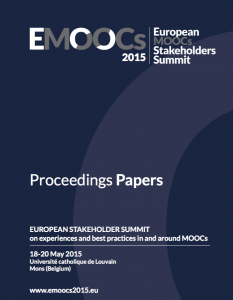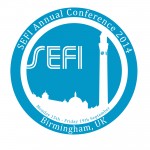Online Learning Research
EMOOCs2015: Reconsidering Retention in MOOCs: the Relevance of Formal Assessment and Pedagogy
 Paper presented at the European Stakeholders summit on experiences and best practices in and around MOOCs in Mons, Belgium (18-20 May 2015).
Paper presented at the European Stakeholders summit on experiences and best practices in and around MOOCs in Mons, Belgium (18-20 May 2015).
Abstract
The motivation to enrol in a MOOC is more diverse than the motivation for a conventional course. This diversity requires re-conceptualization of the terms for enrolment, participation, and achievement. The paper addresses the concept of retention and focuses on engagement relative to assessment. Student retention is often used to determine the value of higher education. In this paper we argue that retention data about specific groups of students
can supply valuable insights to improve MOOC design and align expectations. The paper reports three short studies conducted to gain insights into disengagement from assessment, based on the data gathered in the first five DelftX MOOCs. The empirical part of the paper demonstrates that retention rates in relation to formal assessment vary from course to course. In the analysed case, fewer learners disengaged from the formal assessment in the course with highest degree of student autonomy, high learning support and scaffolds. Consistently across courses, learners who received lower grades on the first assessment task, tend to disengage from further assessment.
Reference
De Vries, P., Hennis, T., Skrypnyk, A., (2015). Reconsidering Retention in MOOCs: the Relevance of Formal Assessment and Pedagogy in Proceedings Paper EMOOCs 2015 (page 168-173): http://www.emoocs2015.eu/sites/default/files/Papers.pdf
LAK15: Scalability and Flexibility through Open Research
Abstract
Delft University of Technology (TUD) is the largest university of engineering sciences in the Netherlands. TUD has been an active member of the Open Resources Movement since 2007 and in 2012 it has joined the EdX consortium. Openness in research and education is central in the TUD mission. It was the first edX partner to issue all its MOOCs under a creative commons license. In this presentation, we present our open research approach and toolbox. This toolbox facilitates sharing of data and the process of collaborative research in the context of MOOCs/online education. The presentation explains our rationale for open research, and our experiences with the toolbox, including research highlights.
Research Seminar: Data Science Speeding up the Online learning curve
Open & Online education is a growing force in higher education. Platforms like EdX and Coursera offer a broad spectrum of Massive Open Online Courses. How do we keep learners engaged throughout a course and how do we assess if leaning goals have been achieved? The massive amount of data, produced by learners inside and outside the Massive Open Online Courses and the challenges for online assessment makes Online education a very interesting field for data science research. In this DDS seminar we will explore the research questions around learning analytics, gamification and online assessment.
How can we build comprehensive learner models that provide fine-grained insights into learners’ abilities, motivations, behaviour, knowledge and learning curves? For example a gaze-based indicator of students’ attention in a MOOC video lecture is proposed to define “with-me-ness” at two levels: perceptual, following teacher’s deictic acts; and conceptual, following teacher discourse.
Experiences of gamification in the classroom give us food for thought for the use of gamification in the online learning environment. How can we use game-based learning to improve the learning outcomes? Assessment in online courses is now often done by multiple choice tests, but many instructors feel a need for automated assessment of “open” answers, designs, programs or other student materials. How can we achieve this? Can natural language processing and machine learning methods enhance online assignments and peer reviews? Will you join us for speeding up the Online learning curve?
Program
Below you will find the overall program of the Research Seminar. For more information about the program and to register, please visit the seminar website.
- 9.30 Welcome/coffee
- 10.00 Opening by Claudia Hauff
- 10.15 Kshitij Sharma – EPFL | École polytechnique fédérale de Lausanne
“Looking THROUGH versus looking AT” - 10.35 Alexandru Iosup – Delft University of Technology
“Gamification in the classroom” - 10.55 Markus Krause – Leibniz Universität Hannover
“Learning at Scale: Promises, Reality, and Vision” - 11.15 Coffee Break
- 11.45 Heide Lukosch – Delft University of Technology
“Game-based learning” - 12.05 Eelco Visser – Delft University of Technology
“Massive Online Assessment – beyond multiple choice” - 12.25 Panel discussion followed by closing remarks by Claudia Hauff
- 13.00 Lunch with posters by companies and researchers
- 14:00 End of program, start of the Education Seminar
Date: Moday March 9th | Time: 9:30 – 14:00 h | location: Culture Centre
SEFI2014: Understanding social learning behaviours of xMOOC completers
 Paper presented at the SEFI Conference 2014 in Birmingham, UK.
Paper presented at the SEFI Conference 2014 in Birmingham, UK.
This paper is about the experiences with the first two MOOCs developed and executed at the Delft University of Technology (TUD) on the edX platform. The courses Solar Energy (ET3034TU) and Introduction to Water Treatment (CTB3365) have a long tradition at the TUD as regular campus courses with a good reputation worldwide. The focus of Solar Energy was on the discovery of solar energy power and the design of a complete photovoltaic system. This was done by introducing the students to the technology for the conversion of solar energy into electricity, heat and solar fuels with a main focus on electricity generation. The focus of the Water Treatment course was to learn about urban water services, including basic drinking water and wastewater treatment technologies. These two treatment chains were described as well as the physical, chemical and biological processes involved. The emphasis was on water quality and the functionality of each unit process within the treatment chain. In relation to their “MOOC”-characteristics, similarly to many other xMOOCs, these two DelftX courses had low completion rates, “knowledge-acquisition” approach to learning design, and relatively low forum activity.
Reference
De Vries, P., Hennis, T., Skrypnyk, A., (2014). Understanding social learning behaviours of xMOOC completers (paper ID 66) in Proceedings of SEFI Annual Conference 2014. ISBN: 978-2-87352-004-5
Download
Download paper Skrypnyk Hennis De Vries 2014 Understanding social learning behaviours of xMOOC completers – SEFI 2014 conference proceedings
THEMA Hoger Onderwijs 2014: Achter de schermen van moocs
Samenvatting
De TU Delft is dit academisch jaar (2013/14) begonnen met het aanbieden van massive open online courses (moocs) via edX; een open source leerplatform ontwikkeld door MIT en Harvard, waarvan intussen de TU, maar ook Stanford en een veertigtal andere universiteiten wereldwijd gebruik maken. Dit artikel gaat over de vraag wat een mooc is, waarom de TU deze aanbiedt, wat voor inspanningen het kost om zo’n mooc te maken en welke ervaringen zijn opgedaan. Voor een deel komt die kennis uit de analyse van de grote hoeveelheid data, die de vele gebruikers van zo’n mooc genereren, in dit geval twee TU-moocs, die in november 2013 zijn afgerond. Er is veel discussie en beweging rond open onderwijs en de uitkomst is nog moeilijk te voorspellen. In deze situatie is het devies van de TU ‘Learn and lead’.
Reference
Pieter de Vries, Joost Groot Kormelink, Thieme Hennis. Achter de schermen van moocs in THEMA Hoger Onderwijs 2014, nummer 1: MOOCs in het Hoger Onderwijs.
Download
Download paper from website (behind login)
SEFI2013: Online Learning and Higher Engineering Education – The MOOC phenomenon
 Paper presented at SEFI 2013 Conference in Leuven, Belgium. Continue reading
Paper presented at SEFI 2013 Conference in Leuven, Belgium. Continue reading
